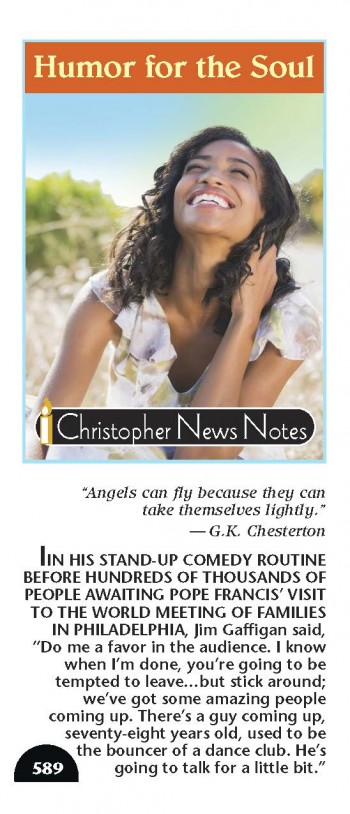 (The following is the text of the Christopher News Note “Humor for the Soul.” If you’d like a pdf or hard copy, see the end of this post.)
(The following is the text of the Christopher News Note “Humor for the Soul.” If you’d like a pdf or hard copy, see the end of this post.)
“Angels can fly because they can take themselves lightly.”
— G.K. Chesterton
In his stand-up comedy routine before hundreds of thousands of people awaiting Pope Francis’s visit to the World Meeting of Families, Jim Gaffigan said, “Do me a favor in the audience. I know when I’m done, you’re going to be tempted to leave…but stick around; we’ve got some amazing people coming up. There’s a guy coming up, seventy-eight years old, used to be the bouncer of a dance club. He’s going to talk for a little bit.”
Of course, Gaffigan was referring to the pope, who, among the many jobs he worked as a young man, was the bouncer of a dance club for a short time before entering the priesthood.
Gaffigan later offered more tongue-in-cheek humor about the struggles of parenting: “Here we are at the World Meeting of Families, right? And parenting, it’s an incredible sacrifice. It is expensive. It’s exhausting. But the good news is, eventually you die.”
Speaking about his kids, Gaffigan said, “I have an eleven-year-old, a nine-year-old, a six-year-old, a four-year-old, a three-year-old. I should really learn their names. But they’re amazing kids. And I will start the bidding at fifty dollars.”
Gaffigan’s use of humor is an outlet for stress, intended to diffuse family tensions, encourage everyone to take themselves a bit more lightly, and demonstrate a way to create joy (and find laughs) in times of difficulty. His monologue brought a spirit of cheer to the World Meeting of Families as people gathered to greet Pope Francis in his first visit to the United States. And the comedian’s jokes about the pope helped to humanize the pontiff, a service for which Francis himself would be grateful.
Between Heaven and Mirth
“Joy is the noblest human act.” — St. Thomas Aquinas
In his book “Between Heaven and Mirth: Why Joy, Humor, and Laughter Are at the Heart of the Spiritual Life,” Father James Martin, SJ, reveals the ways in which humor has enlivened his priesthood and shows how “excessive levity” can be a gift from God.
Father Martin shares numerous stories about holy people using humor to lighten the world around them, including one about a fundraising dinner attended by Cardinal John O’Connor, who served as Archbishop of New York in the 1980s and 90s. At the end of the dinner, the MC took the microphone and began thanking all the people who put the event together.
Describing the MC’s presentation, Father Martin writes, “Unfortunately, he had a poor memory and forgot everyone’s name. Each time he forgot a name, he would pull out a little note card from his pocket to help him remember. ‘I would like to thank our fundraising chairman, um…[he pulled out his note card and glanced down]…Mr. Smith. And I would like to thank our communications director…[he pulled out the card]…Mr. Jones. And I would like to thank our board chairman…[out came the card]…Ms. Johnson.’”
The MC then invited Cardinal O’Connor to the dais to give the benediction. Father Martin writes, “The cardinal walked up to the podium and said, ‘Almighty God, we thank you for all the blessings you have bestowed on us. And we do this in the name of your Son, um…[and he slyly pulled out his own little note card and glanced down]…Jesus Christ.’”
Far from being taken as ridicule, Cardinal O’Connor’s joke endeared him to the MC, as though they were old friends able to poke fun at each other’s shortcomings.
Reflecting on jokes between friends and insider humor, Father Martin explains that the Jesuits have their own lingo, such as their use of the word “Tarbo,” which stands for “Typical Affair Run by Ours.” When something goes wrong in the Jesuits, they call it a Tarbo.
In the tale of one particular Tarbo, Father Martin describes a huge bronze statue of St. Ignatius Loyola that sits in a hallway in the Jesuit headquarters in Rome. On the statue’s pedestal is their founder’s famous expression: “Go set the world aflame.” Father Martin writes: “Next to the statue, firmly affixed to the wall, is a fire extinguisher. Classic Tarbo.”
Father Martin refers to Pope Saint John XXIII as his “avatar for holy humor.” The pope’s “most famous joke came when a journalist innocently asked him, ‘Your Holiness, how many people work in the Vatican?’ John paused, thought it over, and said, ‘About half of them.’”
Father Martin notes that divine humor can speak to us through the circumstances of our lives, especially when we are humble enough to laugh at ourselves. Sharing a humbling yet humorous story from his priesthood, he tells of his time in Africa when a Ugandan woman named Virginia served as his Swahili translator. She would sit beside him and preface all her translations with “Brother anasema,” which means “Brother says.”
Father Martin was studying the Swahili language for a few hours a day, hoping to reach a point of being able to communicate without Virginia’s assistance. After several weeks of study, he finally found himself in a conversation where he knew exactly what to say. So he said it in Swahili.
Recounting the incident, Father Martin writes, “Virginia listened and said, ‘Brother anasema,’ and repeated exactly what I had said, again in Swahili. The woman nodded, thanked me, and left. I turned to Virginia and said, ‘Why did you say that?’
“‘Why did I say what?’ she asked, surprised.
“‘After I used Swahili, you just repeated what I said in Swahili again.’
“‘Oh, Brother,’ she laughed. ‘No one could understand Swahili as poorly spoken as that!’”
Humor on the Journey to God
“Humor is a prelude to faith, and laughter is the beginning of prayer.” — Reinhold Niebuhr
In his book “Operating on Faith,” humorist Matt Weber recounts a particularly low point in his life that occurred shortly after he married his wife Nell. He was in the hospital due to complications that arose following stomach surgery. His suffering led him to feel increasingly distant from God, and he was even having trouble praying.
Talking about his relationship with God, Weber writes, “I was finding that most of my conversations with him sounded more like tweets to an airline during massive delays:
@God Come on big man! Not the level of customer service I’ve come
to expect from you. What gives?
@God Is this some book of Job experiment you’re testing out on me?
Cool idea, I get the point and I’m actually good now. #ThanksNoThanks
@God Why. Seriously, why.”
Weber then describes a short walk he took around the hospital wing. Many of the doors to the rooms were open and he would nod to the nurses and mile at the patients who made eye contact with him. As he neared the end of his loop, he stopped in his tracks upon seeing a sign at the entrance to their wing that read: “Transplant.”
Weber later learned from a nurse that he was the only person on the floor not waiting for an organ transplant. He imagines an apologetic prayer acknowledging that he’s blessed after realizing how good he had it in comparison to everyone else on his floor.
Towards the end of “Operating on Faith,” Weber writes, “If you take away just one thing from this book, I hope it is this: find the meaning. It may not be present in the moment or immediately along the route you choose to explore or experience. It often needs time to marinate and percolate.”
Reflecting on the meaning he has found in his own journey, Weber recalls the realization he had amid his suffering of how interconnected comedy and tragedy can be. In a year in which he married the love of his life, required life-saving stomach surgery, and broke his foot in an impulsive stage dive at the end of a talk at a Catholic conference (leaving him on crutches for several months just when he thought he had regained his health), Weber relied on his sense of humor as his faith in God and bond with his wife were put to the test.
In 2015, a few years after Weber’s tumultuous first year of marriage, he was invited to speak at the Los Angeles Religious Education Congress, which he describes as “the Olympics, Super Bowl, and Vatican Easter Vigil all tied into one special week…the ultimate speaking venue.”
In his talk, he delivered an account of what he calls his “favorite and least favorite year.” He concluded by playing “Ode to Joy” on his harmonica. As he neared the end of the song, he moved toward the edge of the stage and pretended that he was about to do another stage dive. But then he took a step back, finished the song, and thanked everyone for coming.
In the end, Weber’s humor and humility led him to appreciate the simple gifts of life and the love of Nell as she cared for him in sickness during their first year of marriage. Weber writes, “How blessed am I to have met her and been reintroduced to God through her, in a year of profound transformation and learning to not always jump for joy.”
“A day without laughter is a day wasted.” – Charlie Chaplin
A Few Classic One-Liners
• “Middle age is when your age starts to show around your middle.” – Bob Hope
• “One morning I shot an elephant in my pajamas. How he got into my pajamas I’ll never know.” – Groucho Marx
• “Behind every great man is a woman rolling her eyes.” – Jim Carrey
• “I’m at an age where my back goes out more than I do.” – Phyllis Diller
To receive a pdf or mailed copy of “Humor for the Soul” – or to subscribe to Christopher News Notes via email or snail mail – send your request to [email protected]
Stay in touch! Like The Christophers on Facebook:











